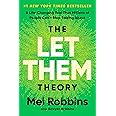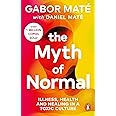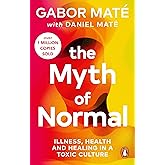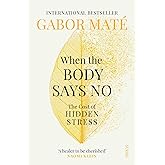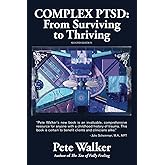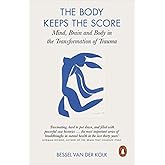
Download the free Kindle app and start reading Kindle books instantly on your smartphone, tablet or computer—no Kindle device required.
Read instantly on your browser with Kindle for Web.
Using your mobile phone camera, scan the code below and download the Kindle app.



 Audible sample
Audible sample Follow the author
OK
The Body Keeps the Score: Mind, Brain and Body in the Transformation of Trauma Paperback – Import, 1 December 2015
You can select and apply an appropriate plan based on your cart value at checkout.
-
Pay at Your PaceZip
| Account type | Interest |
|---|---|
| Zip Pay | Always interest free^ |
| Zip Money | 12 mo interest free,
25.9% p.a. thereafter* |
^Zip Pay: This is a credit product and is interest free. Minimum monthly repayments are required. A monthly account fee of $9.95 is charged by Zip and is subject to change. Pay your closing balance in full by the due date each month and Zip will waive the fee. Available to approved applicants only and subject to completion of satisfactory credit assessment by Zip. Other charges may be payable. Fees and charges subject to change. Zip T&Cs apply. T&Cs available on application. See your Zip contract for further details. Credit provided by Zip Money Payments Pty Ltd (ABN 58 164 440 993), Australian Credit Licence Number 441878.
*Zip Money: Interest free term subject to minimum spend and promotional partner offer. Available to approved applicants only and subject to completion of satisfactory credit check. The repayment advertised will repay the transaction balance within the advertised interest free period. A monthly account fee of $9.95 applies and a one off establishment fee may apply for new customers. Under the contract, minimum monthly repayments are required and will vary depending on your credit limit. Instalment plans split eligible purchases of $300 and above into equal repayments within the interest free period. If you turn off instalments, transactions will be reverted to the minimum monthly repayment. Paying only the minimum monthly repayment may not necessarily repay a purchase within the interest free period. Any balance outstanding at the expiry of the interest free period will be charged at the standard variable interest rate, 25.9% per annum, as at 1 June 2023. Other charges may be payable, see T&Cs. Interest, fees and charges are subject to change. Terms & Conditions apply and are available on application. See your contract for further details. Credit provided by ZipMoney Payments Pty Ltd (ABN 58 164 440 993), Australian Credit Licence Number (441878).
Purchase options and add-ons
What causes people to continually relive what they most want to forget, and what treatments could help restore them to a life with purpose and joy? Here, Dr Bessel van der Kolk offers a new paradigm for effectively treating traumatic stress.
Neither talking nor drug therapies have proven entirely satisfactory. With stories of his own work and those of specialists around the globe, The Body Keeps the Score sheds new light on the routes away from trauma - which lie in the regulation and syncing of body and mind, using sport, drama, yoga, mindfulness, meditation and other routes to equilibrium.
- Print length560 pages
- LanguageEnglish
- PublisherPenguin Press
- Publication date1 December 2015
- Dimensions19.7 x 12.9 x 2.77 cm
- ISBN-100141978619
- ISBN-13978-0141978611
Frequently bought together

Customers who viewed this item also viewed
 For real change to take place, the body needs to learn that the danger has passed and to live in the reality of the present.Highlighted by 35,639 Kindle readers
For real change to take place, the body needs to learn that the danger has passed and to live in the reality of the present.Highlighted by 35,639 Kindle readers Trauma results in a fundamental reorganization of the way mind and brain manage perceptions. It changes not only how we think and what we think about, but also our very capacity to think.Highlighted by 29,091 Kindle readers
Trauma results in a fundamental reorganization of the way mind and brain manage perceptions. It changes not only how we think and what we think about, but also our very capacity to think.Highlighted by 29,091 Kindle readers Being traumatized means continuing to organize your life as if the trauma were still going on—unchanged and immutable—as every new encounter or event is contaminated by the past.Highlighted by 27,641 Kindle readers
Being traumatized means continuing to organize your life as if the trauma were still going on—unchanged and immutable—as every new encounter or event is contaminated by the past.Highlighted by 27,641 Kindle readers
From the brand

-
Pre-order Now
-
Worth the Hype
-
Cozy Colouring
-
New Releases
-
Children's Books
-
Bestsellers
-
Cookbooks
-
Health and Wellbeing
-
Penguin Classics
From the Publisher



Product description
Review
Fascinating, hard to put down, and filled with powerful case histories. . . . the most important series of breakthroughs in mental health in the last thirty years -- Norman Doidge, author of The Brain That Changes Itself
A gripping bestseller about where trauma goes, and its disastrous effects on both individuals and societies. Deeply interesting. ― The Times
Nobody can stop talking about this book right now . . . you might want to listen -- Maddie Bender ― Men's Health
Dr. van der Kolk's masterpiece combines the boundless curiosity of the scientist, the erudition of the scholar, and the passion of the truth teller -- Judith Herman, M.D., author of Trauma and Recovery
Everyone should read this book -- Nigella Lawson
A seminal book that outlines the author's pioneering work -- Thea Jane May ― Vogue
Draws on 30 years of experience to argue powerfully that trauma is one of the West's most urgent public health issues... Packed with science and human stories ... van der Kolk has a lot to say, and the struggle and resilience of his patients is very moving ― New Scientist
Fundamental in understanding how our physical self is connected to all the things we go through and beyond -- Gemma Cairney
A masterpiece of powerful understanding and brave heartedness, one of the most intelligent and helpful works on trauma I have ever read. . . a brilliant synthesis of clinical cases, neuroscience, powerful tools and caring humanity, offering a whole new level of healing -- Jack Kornfied, author of A Path With Heart
Book Description
About the Author
Product details
- Publisher : Penguin Press
- Publication date : 1 December 2015
- Edition : 1st
- Language : English
- Print length : 560 pages
- ISBN-10 : 0141978619
- ISBN-13 : 978-0141978611
- Item weight : 390 g
- Dimensions : 19.7 x 12.9 x 2.77 cm
- Best Sellers Rank: 28 in Books (See Top 100 in Books)
- 1 in Alcoholism & Recovery
- 1 in Trauma Psychology (Books)
- 1 in Post-Traumatic Stress
- Customer Reviews:
About the author

Bessel van der Kolk (born 1943) is a Boston based psychiatrist noted for his research in the area of post-traumatic stress since the 1970s. His work focuses on the interaction of attachment, neurobiology, and developmental aspects of trauma’s effects on people. His major publication, the New York Times bestseller, 'The Body keeps the Score', talks about how the role of trauma in psychiatric illness has changed over the past 20 years; what we have learned about the ways the brain is shaped by traumatic experiences; how traumatic stress is a response of the entire organism and how that knowledge needs be integrated into healing practices.
Bio from Wikipedia, the free encyclopedia.
Customer reviews
Customers say
Customers find the book easy to read and consider it core reading for almost everyone. They appreciate its information quality, particularly how it helps understand the impact of trauma, with one customer noting its use as a support text in psychology and counseling courses.
AI Generated from the text of customer reviews
Select to learn more
Customers find the book easy to read and consider it a must-read, with one customer noting it's a solid standard text for psychologists.
"...Intelligent, beautifully written and a MUST for every home." Read more
"OMG, what a journey, what experiences what insights...." Read more
"Enjoyed this read, very informative" Read more
"Great book, quick delivery" Read more
Customers find the book enlightening and full of information about trauma, with one customer noting its use as a support text in psychology and counseling courses.
"...Bessel talks about the many consequences of trauma, effective treatments and our social responsibility to work towards ending abuse...." Read more
"...Essential reading to develop awareness of how our bodies do keep the score. Intelligent, beautifully written and a MUST for every home." Read more
"OMG, what a journey, what experiences what insights...." Read more
"Enjoyed this read, very informative" Read more
Reviews with images
Book arrived damaged
Top reviews from Australia
There was a problem filtering reviews. Please reload the page.
- Reviewed in Australia on 13 February 2025Format: KindleVerified PurchaseEye opening and insightful. Bessel talks about the many consequences of trauma, effective treatments and our social responsibility to work towards ending abuse. Conventional drug treatments are given too much credit (due to their profitability) whilst there are many much more effective treatments (that he describes in detail and backs up with research)
- Reviewed in Australia on 22 August 2024Format: PaperbackVerified PurchaseHow our body accumulates all the pain - emotional, mental, spiritual and physical - we fabricate daily and stores it for us.
Essential reading to develop awareness of how our bodies do keep the score.
Intelligent, beautifully written and a MUST for every home.
- Reviewed in Australia on 23 September 2024Format: KindleVerified PurchaseOMG, what a journey, what experiences what insights. From the early days and conversations with Freud through Psychopharmacology to Neurofeedback and so many encounters in between. Thank you
- Reviewed in Australia on 13 November 2024Format: PaperbackVerified PurchaseEnjoyed this read, very informative
- Reviewed in Australia on 26 May 2025Format: PaperbackVerified PurchaseGreat book, quick delivery
- Reviewed in Australia on 1 August 2024Format: PaperbackVerified PurchaseI found this helpful in my own recovery from complex trauma and addiction, but it also helped me to understand others. It's clear and informative each chapter is divided into discrete little sections that are easy to digest which make it easy to read.
- Reviewed in Australia on 13 December 2024Format: PaperbackVerified PurchaseThis author's expertise is outstanding.
- Reviewed in Australia on 19 November 2024Format: PaperbackVerified PurchaseI've wanted this book for a while and it is every bit as thought provoking and i pactful as I knew it would be. Trauma does not go away. Our bodies hold onto it. This book shows us how to navigate the legacy of trauma. Highly recommended.
Top reviews from other countries
-
 LisetteReviewed in Sweden on 29 September 2024
LisetteReviewed in Sweden on 29 September 20245.0 out of 5 stars Bra bok
Verified PurchaseBra bok med nyttiga lärdomar, oavsett läsarens ålder.
-
 YessicaReviewed in Mexico on 10 June 2024
YessicaReviewed in Mexico on 10 June 20245.0 out of 5 stars Muy interesante y sanador
Verified PurchaseEs un libro que puedes leer sin saber nada de psiquiatría o psicología, trae incluso varios esquemas que explican todo muy bien. Me encanta que no es un libro tipo "superación personal" (que igual no tiene nada de malo), sino uno que relata con fundamento, casos reales y evidencia científica los procesos de trauma y recuperación. Personalmente, el proceso de lectura también sirve mucho para validar tus sentimientos, es muy bello❤️🩹
 Es un libro que puedes leer sin saber nada de psiquiatría o psicología, trae incluso varios esquemas que explican todo muy bien. Me encanta que no es un libro tipo "superación personal" (que igual no tiene nada de malo), sino uno que relata con fundamento, casos reales y evidencia científica los procesos de trauma y recuperación. Personalmente, el proceso de lectura también sirve mucho para validar tus sentimientos, es muy bello❤️🩹5.0 out of 5 stars
Es un libro que puedes leer sin saber nada de psiquiatría o psicología, trae incluso varios esquemas que explican todo muy bien. Me encanta que no es un libro tipo "superación personal" (que igual no tiene nada de malo), sino uno que relata con fundamento, casos reales y evidencia científica los procesos de trauma y recuperación. Personalmente, el proceso de lectura también sirve mucho para validar tus sentimientos, es muy bello❤️🩹5.0 out of 5 stars Yessica
YessicaMuy interesante y sanador
Reviewed in Mexico on 10 June 2024
Images in this review
-
 CarolinaReviewed in Brazil on 28 April 2024
CarolinaReviewed in Brazil on 28 April 20245.0 out of 5 stars Muito bom!
Verified PurchaseVale a pena a leitura!






